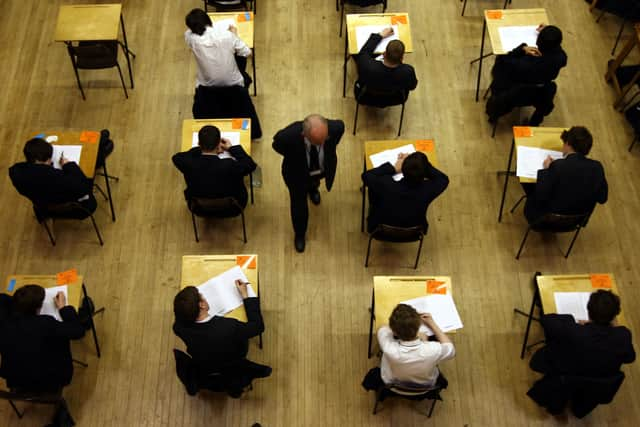GCSE results day 2022: what time do grades come out in England, Wales and Northern Ireland?
and live on Freeview channel 276
The nervous wait is over for thousands of 15 and 16 year olds who sat their GCSE exams in June - with GCSE results day finally upon us.
The 2022 results are particularly important as this year was the first time in three years that students have sat traditional exams in exam halls.
Advertisement
Hide AdAdvertisement
Hide AdPupils did not sit traditional exams in 2020 and 2021 as they were cancelled due to the Covid-19 pandemic.
Students who sat exams this year did, however, have a large part of their education disrupted due to the pandemic and to compensate for that the Department for Education and the exam watchdog Ofqual gave pupils advance information about the topics they were tested on in most papers.
So, when will GCSE pupils receive their results, what do the GCSE grades mean and what grade do teens need to get to pass?
Here’s everything you need to know.


When is GCSE results day 2022?
GCSE results day is always on the last Thursday of August.
That means that in 2022, it falls on Thursday 25 August.
What time will GCSE results be released?
Pupils will be able to get their results from 8am, as this is the time when they are released by the exam boards.
Advertisement
Hide AdAdvertisement
Hide AdPupils will be able to collect their results in person from their school, a tradition that returned last year after being scrapped due to the coronavirus pandemic in 2020.
What do each of the GCSE grades mean?
Ahead of the 2017 GCSE exams, the Government changed the GCSE grading system from A* to G to a numerical system of 9 to 1.
This system was introduced to bring in more differentiation at the top end of the grading scale, and allow sixth forms, colleges, universities and employers to have a better understanding of what level young people are working to.
The exams regulator Ofqual issued the following guide to explain how the the numerical system compares to the old alphabetical system:
- 9 = High A* grade
- 8 = Lower A* or high A
- 7 = Lower A grade
- 6 = High B grade
- 5 = Lower B or high C
- 4 = Lower C grade
- 3 = D or high E
- 2 = Lower E or high F
- 1 = Lower F or G
- U = U remains the same
What GCSE grade do I need to get to pass?
Advertisement
Hide AdAdvertisement
Hide AdThe numerical system means that, while a pass used to be as straightforward as getting a C grade, there are now two marks considered a pass for GCSE students.
Schools are judged by the proportion of its pupils that have achieved a grade 4 and above, with a grade 4 being called a standard pass.
This means that any pupil achieving a grade 4 or above in English and maths will not have to resit these qualifications under regulations introduced in 2015/16.
Schools are also judged on the number of pupils that gain a grade 5, which is called a strong pass, or anything above that.
Advertisement
Hide AdAdvertisement
Hide AdIn addition, the highest grade of 9 isn’t exactly the same as an old A*, if anything it’s better.
This is because a grade 8 is also roughly equivalent to the lower half of the A* band and a higher A.
Under the numerical system only a few students should achieve a grade 9 as they are not given out easily be examiners.
How have GCSE exams being graded this year?
In 2022, examiners will mark exam papers which students completed between May and June, in a return to the traditional method after a two year break in 2020 and 2021.
Advertisement
Hide AdAdvertisement
Hide AdExaminers are mostly experienced teachers, who do their marking on-screen. Their work is quality-checked by exam boards to ensure it is to the correct standard and consistent.
Exams were cancelled across the UK in 2020 and 2021 due to the Covid-19 pandemic, with grades based on teacher assessments instead.
Teachers decided students’ grades using classroom tests, mock exams and work they had completed throughout the year.
Comment Guidelines
National World encourages reader discussion on our stories. User feedback, insights and back-and-forth exchanges add a rich layer of context to reporting. Please review our Community Guidelines before commenting.
